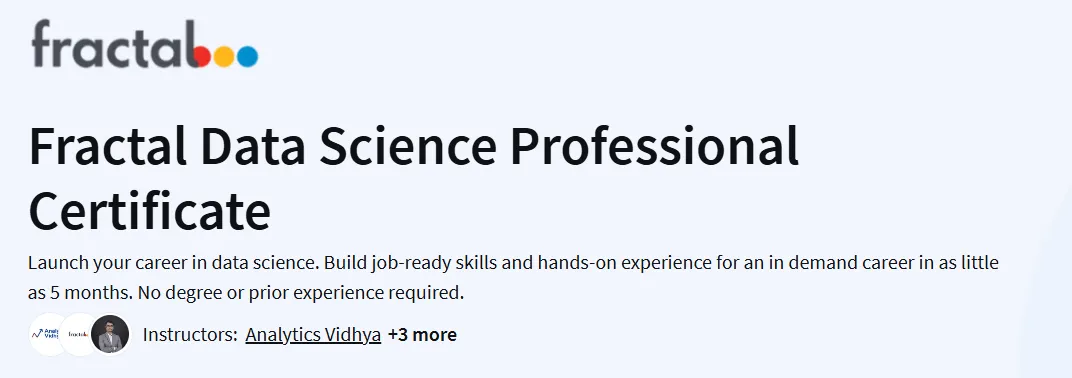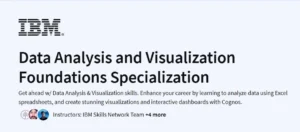What you will learn in Fractal Data Science Professional Certificate Course
- Structured Problem-Solving Techniques: Develop a systematic approach to tackling complex data science problems, emphasizing human-centric design and avoiding common pitfalls.
- Data Analysis Using SQL: Acquire proficiency in SQL for efficient data extraction, manipulation, and analysis, enabling you to handle large datasets effectively.
- Python Programming for Data Science: Learn to use Python for data analysis, including data manipulation, statistical analysis, and building predictive models.
- Data Visualization with Power BI: Gain skills in creating compelling data visualizations and dashboards using Power BI to communicate insights clearly.
- Machine Learning Foundations and Advanced Algorithms: Understand the principles of machine learning and delve into advanced algorithms to build predictive models.
- Data Storytelling and Decision-Making: Learn to craft narratives around data findings to inform and influence business decisions effectively.
Program Overview
Fundamentals of Quantitative Modeling
⏱️ 4-6 weeks
Build foundational knowledge of quantitative modeling, including model design and practical implementation in Excel.
Learn how models support decision-making in finance and business.
Understand best practices for structuring, documenting, and testing models.
Apply basic math and statistical tools used in financial analysis.
Explore model inputs, assumptions, and output interpretation.
Introduction to Spreadsheets and Models
⏱️ 4-6 weeks
This course teaches spreadsheet functionality with a focus on modeling and finance applications.
Develop key Excel skills such as cell referencing, conditional logic, and data analysis.
Construct financial models for budgeting, forecasting, and investment evaluation.
Learn spreadsheet auditing techniques and error detection methods.
Practice model versioning and collaboration in real-world environments.
Modeling Risk and Realities
⏱️ 6-8 weeks
Dive into financial risk modeling and develop techniques to manage uncertainty in forecasts.
Explore scenario and sensitivity analysis to assess model robustness.
Learn probabilistic modeling techniques and risk quantification.
Apply Monte Carlo simulations for advanced risk modeling.
Understand limitations and biases in financial models.
Decision-Making and Scenarios
⏱️ 6-8 weeks
Learn to apply models for strategic decision-making using financial data and forecasts.
Analyze capital budgeting decisions using Net Present Value (NPV) and Internal Rate of Return (IRR).
Understand how to model financing structures, interest rates, and capital allocation.
Use data-driven models to guide business decisions and strategy.
Present scenario-based outcomes to stakeholders using clear visuals and summaries.
Get certificate
Job Outlook
- The demand for finance professionals with quantitative modeling skills is rising, especially in fields like investment banking, equity research, and corporate finance.
- Analysts with financial modeling capabilities earn competitive salaries, with entry-level roles starting around $65K–$90K and senior roles exceeding $120K annually.
- Industries like fintech, consulting, and asset management increasingly seek data-driven decision-makers with strong modeling proficiency.
- Modeling skills improve career prospects for roles such as Financial Analyst, Investment Analyst, Business Intelligence Analyst, and Strategy Consultant.
- Quantitative modeling expertise provides a solid base for CFA, MBA, or further specialization in financial engineering.
- Employers value real-world Excel skills and the ability to communicate insights clearly using models and data.
- This specialization prepares learners for roles that require financial acumen, critical thinking, and advanced spreadsheet proficiency.
Explore More Learning Paths
Boost your data science expertise and strengthen your analytical problem-solving skills with these curated programs designed to provide a strong foundation and practical knowledge for real-world data projects.
Related Courses
What Is Data Science Course – Gain a comprehensive overview of data science, its applications, and key tools used in the field.
Foundations of Data Science Course – Build essential skills in data analysis, statistics, and programming to prepare for advanced data science projects.
Tools for Data Science Course – Learn to leverage industry-standard tools for data cleaning, analysis, visualization, and modeling.
Related Reading
Enhance your understanding of how organizations leverage data for decision-making and innovation:
What Is Data Management? – Explore the strategies and best practices for managing and organizing data effectively in modern enterprises.
Specification: Fractal Data Science Professional Certificate Course
|
FAQs
- The program is designed for beginners, requiring no prior experience in data science or programming.
- It provides foundational knowledge in data analysis, machine learning, and problem-solving techniques.
- The curriculum introduces tools and concepts from scratch, ensuring accessibility for all learners.
- Hands-on projects and exercises reinforce learning and build practical skills.
- The course is self-paced, allowing learners to progress according to their schedule.
- Python: Utilize Python for data analysis and machine learning tasks.
- SQL: Perform data manipulation and querying using SQL.
- Data Visualization: Create visual representations of data to communicate insights effectively.
- Machine Learning: Apply machine learning algorithms to solve real-world problems.
- Problem-Solving Techniques: Develop structured approaches to tackle data science challenges.
- The program consists of 8 courses, with an estimated completion time of 5 months at 10 hours per week.
- The courses are self-paced, allowing learners to start and finish at their convenience.
- Access to course materials is available for a specified period after enrollment.
- Learners can accelerate or slow down their learning based on personal schedules.
- The program is designed to be flexible, accommodating working professionals and students.
- Completing the certificate prepares you for roles such as Data Scientist, Data Analyst, and Machine Learning Engineer.
- The program provides hands-on experience with industry-standard tools and techniques.
- The certificate is recognized by employers and can enhance your resume and LinkedIn profile.
- Salaries for data science professionals range from $85,000 to $120,000 annually in the U.S.
- The program’s practical approach equips learners with skills applicable to various industries.
- The course includes hands-on labs and projects that simulate real-world data science tasks.
- Projects cover areas such as data cleaning, model building, and data storytelling.
- The capstone project allows learners to apply their skills to a comprehensive data science solution.
- Exercises are designed to reinforce learning and provide practical experience.
- Completing these projects can help build a portfolio to showcase your skills to potential employers.





